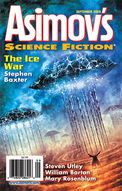
| Editor: | Sheila Williams |
| Issue: | Volume 32, No. 9 |
| ISSN: | 1065-2698 |
| Pages: | 144 |
There's nothing much of note in the non-fiction category in this issue. Robert Silverberg has a minorly interesting retrospective on his first few columns, Paul Di Filippo has a forgettable book review column, and Sheila Williams talks about the reader's choice award winners.
"In the Age of the Quiet Sun" by William Barton: I'm not much of a fan of Barton — I panned the predecessor story "The Rocket into Planetary Space" — but this one wasn't bad. It's less of a paean to space travel and more of an interesting story of personalities. The subject is the reactions and interactions of a three-person crew, one of whom is a computer with human neural material, when they discover an alien artifact. It's not exactly rife with ground-breaking originality, but I enjoyed the cynical tone and the interaction between the main character and the computer. The way the computer changed aspects depending on which of the humans she was interacting with was a nice touch. Forgettable but entertaining. (7)
"Soldier of the Singularity" by Robert R. Chase: This short story of a conversation between a human psychiatrist and a damaged robot turns into a skeptical look at the concept of the Singularity and the people caught up in it. It's not a rebuttal so much as sarcastic doubt, but it's good at that, featuring a nice middle twist. (7)
"Horse Racing" by Mary Rosenblum: The story opens with a scene of black-market trading, narrated by a old hand and broker who is meeting and escorting someone brand new to the scene. It quickly becomes apparent that the goods being traded are people, particularly children, evaluated on their intelligence and potential. But the market isn't quite what it seems, and the slow expansion of Rosenblum's basic concept goes unexpected places and turns into a deeper thought experiment than it might appear. An intriguing story that left me thinking (and planning once again to pick up one of Rosenblum's novels). (7)
"Cut Loose the Bonds of Flesh and Bone" by Ian Creasey: In a world in which the dying can be uploaded and preserved forever as electronic presences, a woman stands at the bedside of her dying and domineering mother. Her mother is planning all that she can do once she's uploaded, preparing for her physical death. Her daughter is struggling with her inability to stand up to her mother about anything. The course and ending of the story are sadly predictable and the daughter is passive and non-confrontational enough to be mildly infuriating, but the characterization isn't bad. Okay, but unoriginal. (5)
"Slug Hell" by Steven Utley: This is another of Utley's prehistoric time travel (or parallel universe travel that looks like time travel) stories. This series always tends more towards the mainstream short story than the typical SF story, featuring little action and lots of introspection. This one, however, is even more plot-free than most. There's a setting, a character, a bit of description, and then it ends. The point apparently went straight over my head. (3)
"Midnight Blue" by Will McIntosh: A couple generations ago, spheres and rods suddenly appeared all over the world, hidden in nooks and crannies, all color-coded. If one assembled two spheres and a rod of the same color, one could absorb the resulting object and gain a power determined by the color. In the early days, everyone had powers, but now that the initial rush is over, spheres and rods are hard to find, expensive, closely guarded, and the province of the rich. Jeff has little hope of ever having a power, something his rich friends rub his nose in constantly. But then, he discovers a sphere of a color never seen before. This is a fun and entertaining story marred mostly by the obvious ending: I knew what the power of Jeff's sphere would be long before the conclusion, which made the twist too predictable to be fun. (6)
"Usurpers" by Derek Zumsteg: A poor kid without the benefits of genetic engineering devotes himself through training and force of will to beating a bunch of rich runners in a cross-country race. The story is the race, focusing on psychology and dirty tricks. It's somewhat interesting for the close look at the tactics, less original in its SF. Not a bad sports short story, but sadly unrealistic in its message. (6)
"The Ice War" by Stephen Baxter: Baxter. Sigh. The main character at least has some character, although painted in broad strokes and taken from a caricature. But otherwise we get an alternative history story of an invasion of Newton's England by alien ice creatures, in which Defoe, Swift, and Newton himself turn up as travelling partners and the creatures are described in painstakingly pointless detail. There's bickering between Defoe and Swift about each other's books, second-rate Stablefordian analysis by Newton, and an homage to War of the Worlds. I found the whole thing dreadfully boring. (4)
Reviewed: 2008-11-09